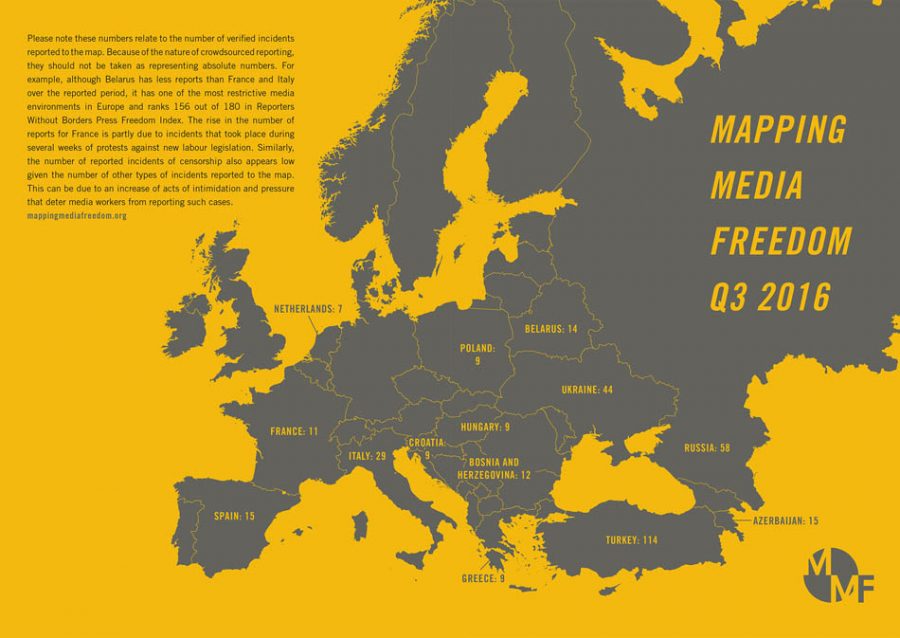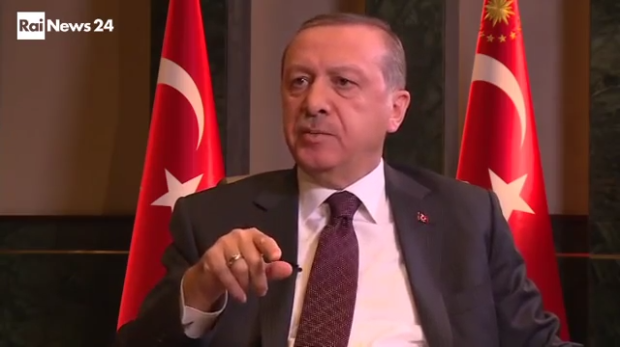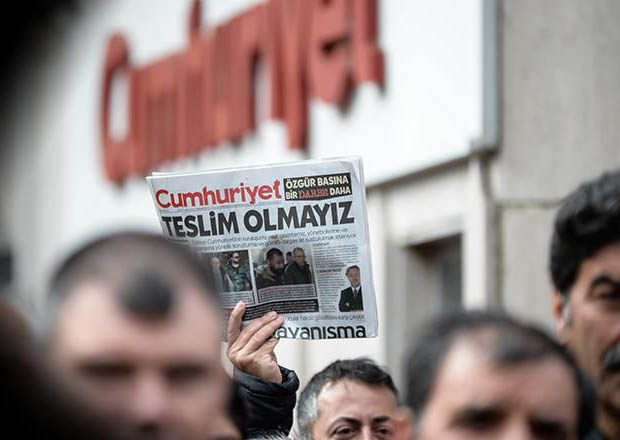29 Nov 2016 | Campaigns, Campaigns -- Featured, Index Reports, Press Releases

An unprecedented series of crackdowns on media professionals and news outlets took place in Europe and neighbouring countries during the third quarter of 2016, recorded by Index on Censorship’s Mapping Media Freedom project.
Between 1 July and 30 September MMF’s network of correspondents, partners and other sources submitted a total of 406 verified reports of threats to press freedom, a 19% rise from the second quarter of 2016.
An important factor in the rise in media violations was the attack on Turkey’s democratically-elected government on 15 July. Following the failed coup attempt, Turkish authorities forced more than 2,500 journalists out of their jobs, arrested and prosecuted 98 under trumped-up criminal charges, detained 133 and seized or shut down 133 media outlets. The post-coup environment in the country is explored in an extensive case study.
“The post-coup situation for media freedom in Turkey is dire. The sheer number of journalists arrested, detained and charged is without precedent in Europe. At the same time the reports collected by the map are pointing to other areas of concern in Russia and Ukraine,” Hannah Machlin, Mapping Media Freedom project officer, said.
Key findings from the third quarter 2016 report:
- Four journalists were killed: Two in Ukraine, one in Russia and one in Turkey
“With nine out of every 10 murders of journalists never solved, the vicious cycle of impunity still prevails. It has to be broken. There can be no exception to the very basic rule that all attacks on journalists must be investigated quickly and thoroughly. We should never give up the fight for journalists’ safety and the struggle to end impunity for crimes committed against journalists,” Dunja Mijatović, OSCE Representative on Freedom of the Media, said.
- 54 incidents of physical assault were reported
- 107 media professionals were arrested; 150 were detained and released
- 112 reports of intimidation, which includes psychological abuse, sexual harassment, trolling/cyberbullying and defamation, were made
“Reporters Without Borders is deeply concerned by the many cases of the use of violent intimidation tactics to silence journalists over the past few months. Acts of violence, and impunity for these acts, has a serious chilling effect on freedom of expression and freedom of information. The increasing use of violence to silence critical voices is part of a global trend of deteriorating press freedom, which must be addressed as a matter of urgent priority”, said Rebecca Vincent, UK Bureau Director for Reporters Without Borders (RSF)
- Journalistic work was censored or altered 29 times
- Media professionals were blocked from covering a story in 89 cases.
The report is available in web and pdf formats.
For more information, please contact Hannah Machlin, Mapping Media Freedom project officer at [email protected]
About Mapping Media Freedom
Mapping Media Freedom – a joint undertaking with the European Federation of Journalists and Reporters Without Borders, partially funded by the European Commission – covers 42 countries, including all EU member states, plus Bosnia, Iceland, Kosovo, Macedonia, Montenegro, Norway, Serbia, Turkey, Albania along with Ukraine, Belarus and Russia in (added in April 2015), and Azerbaijan (added in February 2016). The platform was launched in May 2014 and has recorded over 2,500 incidents threatening media freedom.
25 Nov 2016 | News, Turkey, Turkey Uncensored
[vc_row][vc_column][vc_column_text]
Straddling the division between Europe and Asia, since 1923 the idealised dream of Turkey has been a secular, modern and democratic country. Although weakened by military coups, the imperfect multi-party democracy survived until recently when president Recep Tayyip Erdoğan declared his ambitions for a presidential regime.
While he is already the only political power dominating the entire political scene, July’s coup attempt allowed him to start a massive witch hunt to suppress his political opponents. Half of the country resists him while the other half offers unquestionable support. The nation is split.
Many believe Turkey has entered the last stage of political disarray. The country now has more jailed journalists than China, it has closed more than 370 NGOs under emergency law and it recently imprisoned a number of Kurdish MPs.
But Turkey is not a standalone case. After the election of Donald Trump in the US, the world woke up to the threat posed by populist leaders who have gained unprecedented support in mobilising the masses against the fundamental values of democracy in several countries. These leaders are more similar to Erdogan than we like to think. Therefore polarized, increasingly authoritarian Turkey, located at the door of Europe, might be the example to follow carefully in order to understand what to expect from the bleak future of democracy.
This is my diary of our interesting times.
12 Nov: The Turks want to share their rich experience of political trauma with the Americans, as Erdogan is among the first group of world leaders to congratulate Trump, followed by Sisi and Le Pen. This is party time for the global mobalisation of organised ignorance. Disappointed Americans should prepare themselves for a full-scale war against the system of liberal values by the banal. This won’t be with House of Cards sophistication, because this isn’t Arendt’s “banality of evil” but the evil of mobilised banal.
13 Nov: A literary event in Zagreb feels irrelevant when friends who are writers are in prison. My heart is pounding at the passport line. These days you never know when they will confiscate your passport by reporting it “lost”. Now I know why Walter Benjamin was too late to leave Nazi Germany. You never know when is too late. I think a lot about Frankfurt School crew nowadays while playing a dangerous hopscotch on borders.
15 Nov: American actress Lindsay Lohan jokes have become the the latest PR tool of the Turkish government. The Erdogan-loving actress said on Turkish channels a few days ago: “In Turkey you have free will as a woman, it’s amazing here.” It is not only the evil but also the bizarre we are struggling with. Interior Minister said, “Come and open the 370 NGO’s if you can,” the Interior Minister announced recently. The self-confidence of this ignorance is paralysing.
16 Nov: A government-supporting paper reports on the today’s mine disaster: “Eight trucks and some miners are stuck”. Oxford Dictionary unveils “post-truth” as the word of 2016. It means “relating to or denoting circumstances in which objective facts are less influential in shaping public opinion.” The “fact” is that sixteen miners were stuck and the “truth” is that precision to lead with the number of truck damaged is shameful.
17 Nov: AKP MP’s put forward a motion for amnesty for sexual assailants of minors should they marry their victims. A last minute intervention from the main opposition MP’s stopped the motion, only to be negotiated again next week. This is what I mean when by an attack human values. One morning you find yourself saying: “No, you cannot marry the minors to their rapists.”
19 November: It turns out the new law also rescues all the assailants if the victim is married to one of her rapists. This is nauseating. Women are shocked and furious. Reaction is intense.
22 Nov: “Shock and awe politics” has worked perfectly again. Erdogan, as if he is unaware of the child abuse law, said that draft should be renewed. While everybody was busy with the insane law, more leading Kurdish political figures were imprisoned. This is how they do it. They get you busy by shaking the unquestionable human values as the side show and meanwhile do other things. CNN is now “discussing” the American alt-right’s Richard Spencer’s and his question of whether or not Jews are humans, just like Turkish media “discussed” the minor’s marriage to their rapists. Women’s organisations are gathering in front of the parliament to protest.
Hey Lindsay, it is really amazing here!
In her new book, Turkey: the Insane and the Melancholy, journalist and author Ece Temelkuran discusses the role of the Turkish ministry of culture in censoring theatre productions.

Turkey Uncensored is an Index on Censorship project to publish a series of articles from censored Turkish writers, artists and translators.
[/vc_column_text][/vc_column][/vc_row][vc_row][vc_column][vc_basic_grid post_type=”post” max_items=”4″ element_width=”6″ grid_id=”vc_gid:1485774853759-05b85f69-9fa3-6″ taxonomies=”8607″][/vc_column][/vc_row]
17 Nov 2016 | Mapping Media Freedom, News
[vc_row][vc_column][vc_column_text]Each week, Index on Censorship’s Mapping Media Freedom project verifies threats, violations and limitations faced by the media throughout the European Union and neighbouring countries. Here are five recent reports that give us cause for concern.

After passing a law issued by the interior ministry, Turkey has shut down and arrested members of approximately 370 independent organisations, including many media platforms.
A full list of these organisations is unavailable since the Turkish government claims some cases are still under investigation.
Since the state of emergency declared by Turkey this summer after the attempted military coup, the government has been shutting down media and civil organisations. Some of the organisations recently shut down have been the Dokuz8 News Site, Free Women’s Congress, the Kurdish Writers’ Association and the Fair Women’s Association.
Turkey has declared that all these independent organisations are allegedly linked to terror groups.
One organisation to fall victim to Turkey’s crackdown was the Cumhuriyet Foundation, a secular, liberal media platform. Nine journalists for Cumhuriyet, as well as the president of the executive board, Akın Atalay, were arrested within the past several weeks. They were charged with terrorism, the government saying that although the journalists were not official members of the terrorist group they engaged in activities for the organisation.
The arrest of the Cumhuriyet journalists raises the number of jailed journalists to 144.
Les Jours journalist, Olivier Bertrand, was working in Gaziantep to collect stories about post-coup Turkey. While there, Bertrand was detained by police with no reason given. On Sunday, French Foreign Minister Jean-Marc Ayrault demanded that Bertrand be set free.
Bertrand was released by Turkish authorities and deported back to France.
Freelance journalists Kastus Zhukouski and Aleksei Atroshchanka were working for Belsat TV in Svetlahorsk. While attempting to film trees being cut down by authorities, the two journalists were approached by police, who demanded to see their credentials.
After their IDs were initially checked, a police major who identified himself as Vyazhevich, approached and demanded to see the journalists’ credentials.
Zhukouski and Atroshchanka told the major that they had just shown their IDs and saw no reason so show them again.
Zhukouski told Belsat.eu that, the “major began to shake– his reaction was strange. He began to yell at us, asking if we have accreditation? We said that the right to freely spread information is guaranteed by the Constitution of Belarus. Major said we had to go to the police station. We did not resist. In the station he behaved inappropriately: grabbed the camera, my arm, pushed me, insulted me, and tried to provoke me in every way. I wrote a complaint about such actions of the police…”
After being held in the police station for three hours and having their belongings searched, the journalists were released.
Dennis Schouten, a journalist for PowNed was assaulted at a Rotterdam protest against the children’s character, Black Pete, who is part of the yearly celebration of Saint Nicholas. The character is supposed to be Saint Nicholas’ servant and is usually portrayed by a white person in blackface. The protesters were arguing the portrayal is racist.
While interviewing a protester, Schouten was pushed in front of a moving car. The reporter received no injuries.
The perpetrator was arrested by police at the scene.
Novaya Gazeta correspondent Dmitry Rebrov and a film crew for TV Rain were detained while covering truck driver protests in Moscow.
The demonstrators were protesting the “Plato” system, which charges the drivers tolls on federal highways.
Police detained the journalists when arresting the protesters. [/vc_column_text][/vc_column][/vc_row][vc_row][vc_column][vc_column_text]
Click on the bubbles to view reports or double-click to zoom in on specific regions. The full site can be accessed at https://mappingmediafreedom.org/
[/vc_column_text][/vc_column][/vc_row][vc_row][vc_column][vc_basic_grid post_type=”post” max_items=”4″ element_width=”6″ grid_id=”vc_gid:1479460802604-326201e9-0959-9″ taxonomies=”6564″][/vc_column][/vc_row]
11 Nov 2016 | Mapping Media Freedom, News
[vc_row][vc_column][vc_column_text] Each week, Index on Censorship’s Mapping Media Freedom project verifies threats, violations and limitations faced by the media throughout the European Union and neighbouring countries. Here are five recent reports that give us cause for concern.
Each week, Index on Censorship’s Mapping Media Freedom project verifies threats, violations and limitations faced by the media throughout the European Union and neighbouring countries. Here are five recent reports that give us cause for concern.
Turkey’s main internet regulator, Information and Communication Technologies, sent instructions to operators to close VPN services, according to technology news site Webtekno.
The ICT said it was acting within the scope of Article 6, paragraph 2 of law no 5651 in adopting a decision requesting Turkish operators to shut down VPN services.
The decision covers popular encryption services as Tor Project, VPN Master, Hotspot Shield VPN, Psiphon, Zenmate VPN, TunnelBear, Zero VPN, VyprVPN, Private Internet Access VPN, Espress VPN, IPVanish VPN.
According to Webtekno some VPN services are still available such as Open VPN.
“This is clearly detrimental to journalists and the protection of their sources,” Hannah Machlin, project officer for Mapping Media Freedom, said.
Turkey’s internet censorship did not stop with VPNs as the country faced a shutdown of the popular social media sites Facebook, YouTube, Twitter and more. This was the first time in recent years that the Turkish government targeted popular messaging apps such as WhatsApp, Skype and Instagram, according to Turkey Blocks.
The Independent states that it’s unclear whether the social media outage came from an intentional ban, an accident or a cyber attack. Turkey Blocks believes the outage was related to the arrest of political activists for the opposition party the previous night.
Turkey has increasingly utilised internet restrictions to limit media coverage in times of political unrest.
Spanish group Morera and Vallejo, has decided to slash contracts with photographers working for their newspaper, El Correo de Andalucía, according to the Sevilla Press Association (APS).
The three photographers working as “fake” freelancers for the newspaper were on a permanent contract without the benefits of being an employee. New contracts for the photographers worsened their conditions, lowering their pay and lessening the work photographers can put in daily.
APS additionally states that journalists working for El Correo de Andalucía are expected to act as photographers as well, doubling the amount of work they must put in. The newspaper pushed for the merging journalism and photography but journalists are unwilling to steal their coworkers’ jobs.
Four journalists from the Center for Investigative Reporting in Serbia (CINS) have noted that they have been followed and photographed on mobile phones by unknown individuals, NUNs Press reported.
CINS, which is known for reporting on corruption and organised crime in Serbia, believes the stalkers are an attempt to intimidate their journalists. Editor-in-chief Dino Jahic stated that they’re unsure who is behind the harassment, “We are working on dozens of investigations all the time, and each of them could trigger somebody’s anger.”
On its website, CINS wrote that they were determined to continue their investigations despite the intimidation. Their case has been reported to the Ministry of Interior and the public prosecutor’s office in Belgrade.
The online investigative news site Ukrayinska Pravda has reported that Ukrainian authorities wiretapped the outlet’s offices during the summer of 2015.
Editor-in-chief Sevgil Musayeva-Borovyk said in March of 2016, an unidentified person handed in an envelope with operational reports, activities and topics recently discussed by UP. The site has no evidence that wiretapping has continued since then.
According to Ukrayinska Pravda, the security service of Ukraine was carrying out orders from the president’s administration. Ukrayinska Pravda reported that it was not only its journalists that were targeted, claiming the staff of several other media sites have been tapped. Mapping Media Freedom does not yet know which other organisations.
Journalists have asked the security service of Ukraine, interior minister and chairman of the national police to respond to the information UP has gathered.[/vc_column_text][/vc_column][/vc_row][vc_row][vc_column][vc_column_text]
Click on the bubbles to view reports or double-click to zoom in on specific regions. The full site can be accessed at https://mappingmediafreedom.org/
[/vc_column_text][vc_basic_grid post_type=”post” max_items=”4″ element_width=”6″ grid_id=”vc_gid:1478786551399-adbbd256-7b8d-7″ taxonomies=”6564″][/vc_column][/vc_row]





 Each week, Index on Censorship’s
Each week, Index on Censorship’s